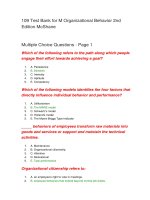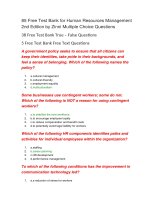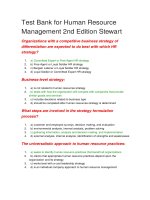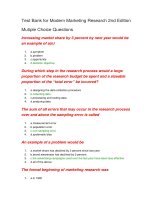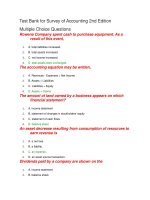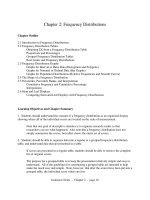Test bank for physics for the life sciences, 2nd edition
Bạn đang xem bản rút gọn của tài liệu. Xem và tải ngay bản đầy đủ của tài liệu tại đây (63.61 KB, 12 trang )
full file at
CHAPTER 3—FORCES
MULTIPLE CHOICE
1. Which of the following is NOT a fundamental force?
a. frictional force
b. electromagnetic force
c. weak nuclear force
d. gravitational force
ANS:
RAT:
PTS:
REF:
BLM:
A
frictional force is the outcome of electromagnetic force
1
p. 48
Remember
2. If you pull a sled up a slope, what is correct for the magnitude of a normal force?
a. It is less than the weight of the sled.
b. It is larger than the weight of the sled.
c. It is equal to the weight of the sled.
d. It is zero.
ANS: A
RAT: normal force is a perpendicular component of the weight to the incline, smaller than the entire
weight
PTS: 1
REF: p. 50
BLM: Higher Order
3. Which one of the following is a vector?
a. speed
b. mass of your textbook
c. weight of your textbook
d. pressure
ANS:
RAT:
PTS:
REF:
BLM:
C
weight is a force, a vector
1
p. 52
Remember
4. The SI unit of force is the Newton. Express the Newton in terms of basic SI dimensions, mass M,
length L, and time T.
a. L M-1 T-2
b. L-1 M-1 T2
c. L M T-2
d. L M-1 T2
ANS:
RAT:
PTS:
REF:
BLM:
C
kg m s2
1
p. 54
Higher Order
full file at
5. Which one is the weakest of all fundamental forces?
a. the gravitational force
b. the weak nuclear force
c. the strong nuclear force
d. the electromagnetic force
ANS:
RAT:
PTS:
REF:
BLM:
A
Gravitational force is the weakest of all fundamental forces.
1
p. 54
Remember
6. For two bodies gravitationally interacting with each other, if you double each mass and halve the
distance between them, by how much would the gravitational force change?
a. increase 8 times
b. increase 16 times
c. decrease 8 times
d. decrease 16 times
ANS:
RAT:
PTS:
REF:
BLM:
B
F1=Gm1m2d2, F2=G2m12m2 (d2)2 = (4) (4) Gm1m2d2 = 16 Gm1m2d2 = 16 F1
1
p. 55
Higher Order
Some bodies in the Solar System are listed in Table 3.1 with masses and radii.
Table 3.1
Plane or moon
Mercury
Venus
Earth
Moon
Mars
Jupiter
Mass (kg)
3.30 · 1023
4.87 · 1024
5.97 · 1024
7.35 · 1022
6.42 · 1023
1.90 · 1027
Radius (m)
2.44 · 106
6.05 · 106
6.38 · 106
1.74 · 106
3.40 · 106
7.15 · 107
7. Based on the data in Table 3.1, what is the relationship between weights of the same object on Earth
and the Moon?
a. Weight of the object on Earth is 6 times the weight of the object on the Moon.
b. Weight of the object on Earth is 6 times smaller than the weight of the object on the Moon.
c. the weight is the same on both
d. Weight of the object on Earth is 22 times the weight of the object on the Moon.
ANS:
RAT:
PTS:
REF:
BLM:
3-2
A
gravitational acceleration on the Earth is 6 times larger than on the Moon
1
p. 55
Higher Order
Copyright © 2013 Nelson Education Limited
full file at
8. Based on the data in Table 3.1, what is the mass of an object on Jupiter, when its measured weight on
Earth is 21 N?
a. 2.1 kg
b. 5.3 kg
c. 2.1N
d. 53 N
ANS: A
RAT: the mass of the object is the same on any planet/moon, and is equal to the mass on the Earth:
21N = m (9.81 ms2), m = 21N 9.81 ms2 = 2.1 kg
PTS: 1
REF: p. 55
BLM: Higher Order
9. A ball is thrown up in the air. Halfway to its maximal height, what is the net force acting on the ball?
Assume that there is no air resistance.
a. The net force is zero N.
b. The net force is less than its weight.
c. The net force is greater than its weight.
d. The net force is equal to its weight.
ANS:
RAT:
PTS:
REF:
BLM:
D
net force is equal to weight throughout the trajectory
1
p. 55
Higher Order
10. Gravity on the Moon’s surface is less than gravity on the Earth’s surface. For two identical objects,
one on the Earth, and the other on the Moon, how do the mass and weight compare?
a. The mass of the object on the Moon is larger than the mass of the object on the Earth.
b. The masses of both objects are the same, but the weight of an object on the Moon is less.
c. The weights of both objects are the same, but the mass of an object on the Moon is less.
d. The objects in both places have the same mass and the same weight.
ANS:
RAT:
PTS:
REF:
BLM:
B
mass is invariant, weight depends on gravity
1
p. 55
Higher Order
Copyright © 2013 Nelson Education Limited
3-3
full file at
11. Two identical spheres are resting on a horizontal surface at a distance of 0.04 m from each other, each
attached to an identical un-stretched spring with a spring constant of 100Nm. If we charge the spheres
with a negative charge of -1.60 C each, what is the new spacing between the spheres? Coulomb’s
constant is k = 9.0 109 N m2\ C2.
a. 0.14 m
b. 0.18 m
c. 0.32 m
d. 0.36 m
ANS: C
RAT: k q1q2d2 = kspring x, compression of each spring x=0.14m, we add compressions of each spring
(2 0.14 m) to the old spacing d=0.04 m , total new spacing is 0.04m + 0.14m + 0.14m = 0.32 m
PTS: 1
REF: p. 57 | p. 63
BLM: Higher Order
12. Two identical spheres are resting on a horizontal surface at a distance of 0.01 m from each other, each
attached to an identical un-stretched spring with a spring constant of 100N/m. If we charge the spheres
with a negative charge of 1.60 µC each, what is the compression of each spring? Coulomb’s constant
is k = 9.0 109 N m2\ C2.
a. 0.14 m
b. 0.18 m
c. 0.32 m
d. 0.36 m
ANS:
RAT:
PTS:
REF:
BLM:
A
k q1q2/d2 = kspring x, compression of each spring x=0.14m
1
p. 57 | p. 63
Higher Order
13. You push a chair across the floor and it moves with a constant velocity. What is true for the force of
friction?
a. The force of friction is less than the force with which the chair is being pushed.
b. The force of friction is equal to the force with which the chair is being pushed.
c. There is not enough information for conclusion.
d. The force of friction is zero.
ANS: B
RAT: constant velocity means that the net force is zero, therefore the force with which the chair is
being pushed is balanced by friction
PTS: 1
REF: p. 60 | p. 65
BLM: Higher Order
3-4
Copyright © 2013 Nelson Education Limited
full file at
14. Which of the following is correct for the force of static friction between two surfaces?
a. It depends on the contact area.
b. It is proportional to the normal force.
c. It is larger than the applied force.
d. It is smaller than the applied force.
ANS:
RAT:
PTS:
REF:
BLM:
B
definition of static friction
1
p. 61
Remember
15. The coefficient of static friction between a set of tires on a car and a steep road is 0.58. What is the
steepest angle of the road on which the car can stay at rest without slipping downhill?
a. 15
b. 30
c. 45
d. 60
ANS:
RAT:
PTS:
REF:
BLM:
B
mg sin = mgcos,
1
p. 61 | p. 65
Higher Order
tan = , tan = 0.58, tan1(0.58) = 30
16. A 6-kg box on a 30 incline is held by a spring attached to the wall, parallel to the incline. The box is
not moving. What is the extension of the spring if the spring constant is 100 N/m?
a. 0.03 m
b. 0.06 m
c. 30 cm
d. 60 cm
ANS:
RAT:
PTS:
REF:
BLM:
C
m g sin30 = kx, x=0.3 m = 30 cm
1
p. 63
Higher Order
17. You drop two iron marbles into a jar of honey. The area of the larger marble is 9 times the area of the
smaller one. If the velocity of the smaller marble is half the velocity of the large one, what is the ratio
of the viscous forces on the two marbles?
a. Viscous force on the large marble is 6 times greater than on the small marble.
b. Viscous force on the small marble is 6 times greater than on the large marble.
c. Viscous force on the large marble is 18 times greater than on the small marble.
d. Viscous force on the small marble is 18 times greater than on the large marble.
ANS:
RAT:
PTS:
REF:
BLM:
A
Al=9As, 4rl2= (9) 4rs2, rl = 3 rs, Fs = 6 rs vs, Fl = 6 (3)rs (2)vs = 6 Fs
1
p. 64
Higher Order
Copyright © 2013 Nelson Education Limited
3-5
full file at
18. A bird rests at the centre of a thin rope, suspended between poles 0.5 m apart. The rope sags 2 cm
under the bird’s weight, and the tension in each side is 5N. What is the mass of this bird?
a. 200 g
b. 100 g
c. 50 g
d. 25 g
ANS: B
RAT: from geometry the angle of each side of the rope with respect to horizontal is 5.7 , equilibrium
of forces mg = 2T sin 5.7 , m = 0.1 kg = 100 g
PTS: 1
REF: p. 65
BLM: Higher Order
19. Two identical boxes are on an inclined plane. Box 1 slides down, while box 2 remains at rest on the
incline. What can we conclude?
a. The frictional force is the same for boxes 1 and 2.
b. The frictional force on box 1 is larger than on box 2.
c. The frictional force on box 2 is larger than on box 1.
d. We need to know the weights of the two boxes to draw a conclusion about frictional
forces.
ANS:
RAT:
PTS:
REF:
BLM:
C
the stationary box experiences larger friction
1
p. 66
Higher Order
20. A 50 kg skier is pulled up a 28 slope at a constant speed, by a friend applying a force of 300 N. What
is the coefficient of kinetic friction between the snow and the skier?
a. 0.18
b. 0.30
c. 0.36
d. 0.63
ANS:
RAT:
PTS:
REF:
BLM:
A
300N = mg ( sin + cos)
1
p. 66
Higher Order
TRUE/FALSE
1. The origin of contact forces is electromagnetism.
ANS:
RAT:
PTS:
REF:
BLM:
3-6
T
On the microscopic level, all contact is the interaction of atoms through electromagnetic forces.
1
p. 48
Remember
Copyright © 2013 Nelson Education Limited
full file at
2. You are standing on the floor, not moving. This means that there is no gravity acting on you.
ANS: F
RAT: No, gravity acts on me, but the floor exerts normal force that is equal to my weight but opposite
in direction.
PTS: 1
REF: p. 51
BLM: Higher Order
3. The gravitational force with which the Earth attracts you is larger than the force with which you attract
the Earth.
ANS: F
RAT: Gravitational force is a mutual force between two objects and is the same for both; it’s just the
acting of two bodies in opposite directions.
PTS: 1
REF: p. 55
BLM: Higher Order
4. Magnetic monopoles (North and South Pole) cannot be found separated like electric charges.
ANS: T
RAT: No matter how small we cut the magnet, it always appears with both poles; no separated
magnetic monopoles have yet been found.
PTS: 1
REF: p. 58
BLM: Remember
5. Normal force is always a response of a surface to the entire weight of the body.
ANS: F
RAT: When a surface is inclined, the normal force is a reaction force to a component of weight
perpendicular to the surface.
PTS: 1
REF: p. 59
BLM: Remember
6. If you are trying to push a crate along the rough floor and it does not move, there is static friction
acting between the floor and the crate. The magnitude of static friction is always larger than the
applied force, therefore the object does not move.
ANS:
RAT:
PTS:
REF:
BLM:
F
The magnitude of static friction is equal to the applied force.
1
p. 60
Higher Order
Copyright © 2013 Nelson Education Limited
3-7
full file at
7. We are trying to move a crate across a rough surface. We keep increasing the force until the crate starts
moving. Since there is a range of magnitudes of a force, this means that kinetic friction has a range of
values before the crate starts moving.
ANS: F
RAT: Static friction has a range of values while the crate does not move; kinetic friction exists when
the crate is moving.
PTS: 1
REF: p. 61
BLM: Higher Order
8. Viscous force in a fluid is what is called drag in the air.
ANS:
RAT:
PTS:
REF:
BLM:
T
The force of resistance to the motion of a body in air is called viscous force in liquid.
1
p. 63
Remember
9. Since viscous forces in fluid and air drag are the same in nature, both depend linearly on the object’s
velocity.
ANS: F
RAT: Drag in the air depends with the square of object’s velocity, while viscous force has linear
dependence on the object’s velocity.
PTS: 1
REF: p. 63-64
BLM: Remember
10. Although gravity accelerates you when you fall freely, it is possible to achieve a constant velocity after
you jump off the airplane.
ANS: T
RAT: If weight becomes balanced by the resistance of air, net force on the body is zero and the body
falls with a constant velocity (called “terminal velocity”).
PTS: 1
REF: p. 63
BLM: Higher Order
ESSAY
1. Can gravity act as a restoring force? Give an example.
ANS:
yes, pendulum
RAT: We displace pendulum from equilibrium, and weight (due to gravity) causes pendulum to
swing down.
PTS: 1
REF: p. 53
BLM: Higher Order
3-8
Copyright © 2013 Nelson Education Limited
full file at
2. Which one is stronger, the gravitational force with which you attract the Earth or the gravitational
force that the Earth exerts on you?
ANS:
the forces are the same
RAT: Gravity is a mutual force between two bodies.
PTS: 1
REF: p. 55
BLM: Higher Order
3. For the law of gravity equation, F = G m1 m2 / r2, to be dimensionally consistent, what must be the
units of universal gravitational constant?
ANS:
N m2 / kg2
RAT: from substituting into the equation all the units for force, mass, and distance
PTS: 1
REF: p. 55
BLM: Higher Order
Some bodies in the Solar System are listed in Table 3.1 with masses and radii.
Table 3.1
Plane or moon
Mercury
Venus
Earth
Moon
Mars
Jupiter
Mass (kg)
3.30 · 1023
4.87 · 1024
5.97 · 1024
7.35 · 1022
6.42 · 1023
1.90 · 1027
Radius (m)
2.44 · 106
6.05 · 106
6.38 · 106
1.74 · 106
3.40 · 106
7.15 · 107
4. From the data for Earth and the Moon in Table 3.1, how many times stronger is Earth’s gravitational
field than the Moon’s?
ANS:
gEarth/gMoon = 6
RAT: gEarth = G MEarth / REarth2 gMoon = G MMoon / RMoon2
PTS: 1
REF: p. 55
BLM: Higher Order
5. What is the difference between mass and weight?
ANS:
mass is amount of matter in you, weight is a force
RAT: weight is a force of gravity between an object and the Earth (or any other body on which the
object is located)
PTS: 1
REF: p. 55
BLM: Higher Order
Copyright © 2013 Nelson Education Limited
3-9
full file at
An atom consists of three types of particles: electrons, protons, and neutrons. Their charges and
masses are given in Table 3.2.
Table 3.2
particle
electron
proton
neutron
mass (kg)
9.11 10-31
1.673 10-27
1.673 10-27
Charge (C)
-1.602 10-19
1.602 10-19
0
6. Using data from Table 3.2, calculate the ratio between the electrostatic force and the gravitational
force between the proton and the electron in a hydrogen atom, if the distance between the electron and
the proton is r = 5.3 109 m. The universal gravitational constant G = 6.67 10-11 m3 kg-1 s-2, and
Coulomb’s constant k = 9.0 109 N m2 / C2.
ANS:
Fel/ Fgrav 1039 order of magnitude
RAT: Fgrav = G mproton m electron / r2 = 6.7 1047 N; Fel = k qproton qelectron / r2 = 8.21 108 N
PTS: 1
REF: p. 58
BLM: Higher Order
7. The surface tension of water makes it possible for certain insects to walk on the surface of water.
What is the origin of surface tension?
ANS:
electromagnetic force
RAT: the molecule of water is a polar molecule, with strong bonds between molecules, so the surface
acts as an elastic film
PTS: 1
REF: p. 58
BLM: Remember
8. If the weight of a chest is 560 N, and you try to push it along the floor with a force of 295 N, and the
coefficient of static friction between the floor and the chest is µ = 0.5, will the chest move?
ANS:
yes
RAT: maximal force of static friction is ff,static = Weight = 0.5 560 N = 280 N, applied force 295 N
is stronger
PTS: 1
REF: p. 61
BLM: Higher Order
3-10
Copyright © 2013 Nelson Education Limited
full file at
9. We are trying to move a crate across rough surface. We keep increasing the force until the crate starts
moving. Since there is a range of magnitudes of force applied before the crate starts moving, does this
mean that kinetic friction has a range of values as well?
ANS:
no
RAT: Static friction has a range of values before the crate starts moving; kinetic friction occurs during
motion and has one value.
PTS: 1
REF: p. 61
BLM: Higher Order
10. If a 50 kg skier is pulled by a rope up the 15 slope, what is the minimum tension in the rope? The
coefficient of friction is 0.2.
ANS:
220 N
RAT:
PTS:
REF:
BLM:
T = mg sin15 + mg cos15 = 220 N
1
p. 66
Higher Order
Copyright © 2013 Nelson Education Limited
3-11
full file at
3-12
Copyright © 2013 Nelson Education Limited

